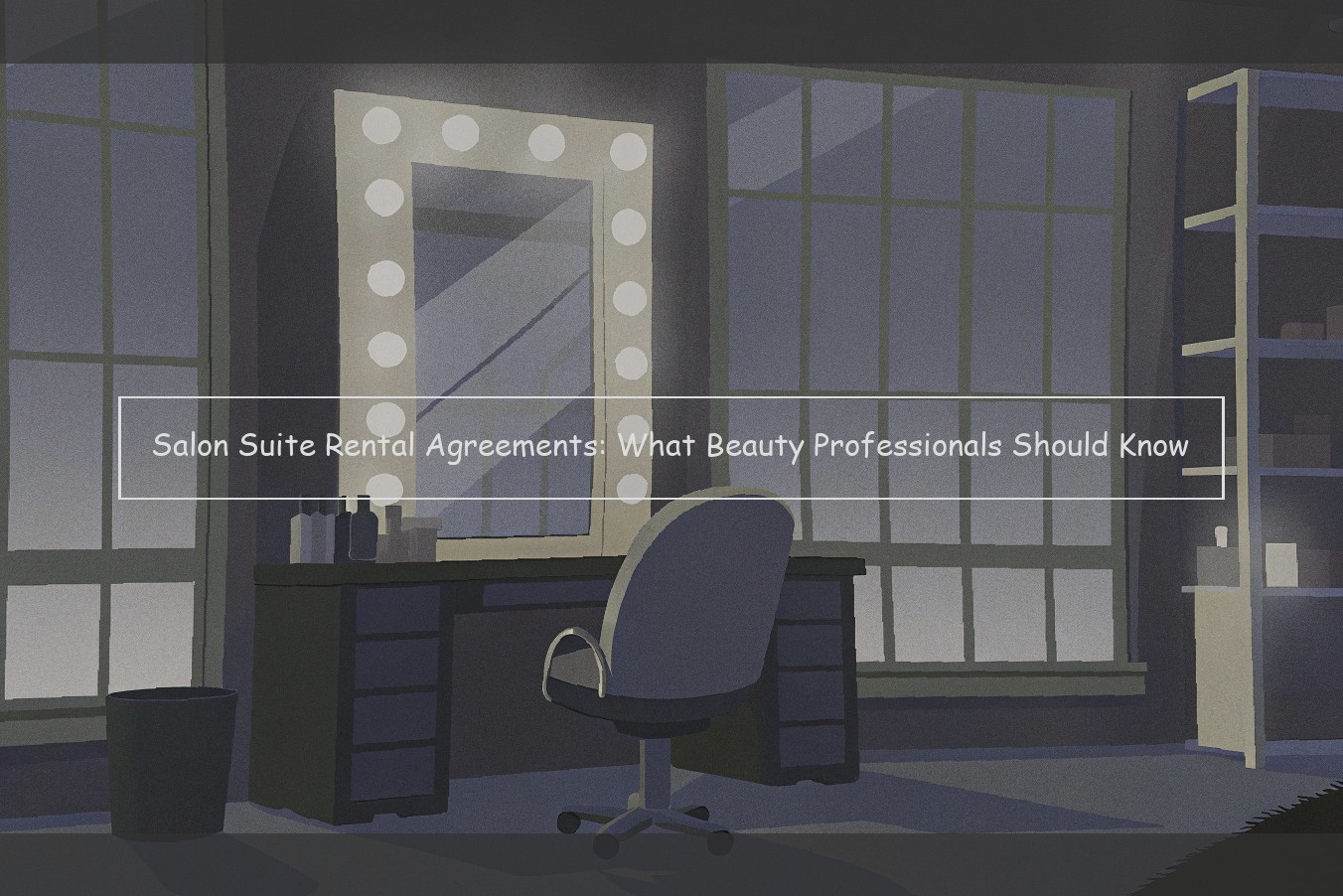Salon Suite Rentals 101
A salon suite rental arrangement is a business deal between a cosmetologist, barber, or related professional who is renting space for their work from a landlord or the owner of the specific salon suite facility. At the same time, the professionals who rent these suites are similar to traditional barbers and hairstylists in terms of their actual job and duties. While all of these professionals are providing specific services for their clients, a salon suite rental agreement generally allows the stylist or barber more freedom and independence than a traditional hairstylist might have.
These stylists operate their beauty business without supervision, and they can keep most, if not all, of the money they make on hair, nails, and beauty-related services they provide to their clients . The salon suite environment allows stylists to have a corridor space that is dedicated only to them and not shared with other professionals. These facilities are set up in individual suites with multiple rooms at one location to rent to professional beauticians or hairdressers. Hairstylists can sometimes take other services like massage therapy in addition to their job.
The suite for beauticians or hairstylists is generally separate from the rest of the salon. This means that owners of the suite rental facility can allow stylists to have their own independent client list. As an independent business, they would be responsible for their tax structure, schedule, and daily plans. While this is the basic structure of the traditional salon suite rental, the specific environments can vary by facility.

A Closer Look at a Salon Suite Rental Agreement
A comprehensive salon suite rental agreement is designed to protect both the salon owner and the professional renting the space. Beyond the basic information, a good agreement will address everything from the responsibilities of each party to consequences for defaulting on the terms. Here are the key elements of a salon suite rental agreement:
Lease Terms
The lease term is the duration of the rental agreement. Most salon suite rental agreements are month-to-month or year-to-year contracts, which give the renter the flexibility to decide whether to continue renting on a regular basis.
Rental Costs
The monthly rental fee is often among the key considerations for any prospective renter. In addition to the monthly fee, the contract should also address the cost of other common expenses. Some owners will charge a flat fee to cover the costs of shared areas, utilities and Wi-Fi. Others will charge a la carte for these services, such as a small fee for Wi-Fi or spilt utilities costs.
Space Usage
In a salon suite, professionals will often occupy cubicles or partial spaces in the owner’s larger facility. A thorough rental agreement maps out the areas that the tenant can access and the hours that they are available. It should also cover things like how things such as furniture can be moved around the space and what happens when the process of styling hair, nails etc. causes the tenant to create a mess in a shared area of the salon.
Pros and Cons of Renting a Salon Suite
Just like every other subject in life, there are advantages and disadvantages to renting a suite to operate your beauty business. Here’s a few things to consider on both sides of the aisle in the debate.
BENEFITS
No Boss. When considering this type of business arrangement, you should like the idea of being your own boss. No more stylish making demands. No one hounding you to sell a certain amount of the latest styling product. No employee meetings. You are fully in charge of your business.
Flexibility. Once you are in an agreement with a salon suite provider, you can generally occupy your space for as long as you like. A one year lease, though, is fairly common. However, for the most part, you can easily move to another suite (within that complex) whenever you desire. If your suite is too big, too small, the wrong location or just not to your liking, it’s fairly easy to find another salon to upgrade or downgrade your situation.
Independent of salon branding. No one is going to care, or have an expectation, that your personal branding is consistent with another stylist. You will also know that clients are seeing you for you and not for the salon. You do not have to refer to yourself as "stylist X at Y salon". You are free to build your own personal brand.
Time Freedom. You set your own schedule. You are both stylist and the front desk when it comes to booking and managing appointments. You also decide when to open and close and how much time you wish to spend with each client, so long as you are generating revenue. The days of two or three clients being squeezed into my schedule are long gone.
Profits. Suite providers make very little money. Their profit is made on the rental agreements and providing services to help you build business. You keep all of your profits. When a client comes in for a $100 color service, you keep the full $100. When a shampoo bottle is bought for $20, you get the full commission off of it. You can be as aggressive or laid back as you wish when it comes to retail. But regardless of the approach, you are collecting the entire dollar amount of the sale.
DRAWBACKS
No Voice In Appearance. The salon suites are furnished by the provider, you have no input into the overall salon appearance. Lighting, fixtures, paint colors, and furniture designs are all left up to the provider. Minor adjustments can usually be made at your expense. If you have a strong opinion of what your salon suite looks like, this is not the place for you.
No Foot Traffic. This is obviously offset by the fact that very few clientele are searching out a salon suite. The reality is that there is no impulse traffic. You will be reliant on your current client list for hitting the ground running. While that is not a negative, it is important to factor that into the equation when deciding whether or not you wish to pursue this option.
A Little Lonely. Unless you are working in a commercial space with other stylists working the same shifts, you are going to be alone a lot. Human resource is an important aspect of the industry and important for keeping energy and momentum alive. If you are accustomed to being in a busy salon, the salon suite is going to feel lonely at times.
Limited Support. While you will be totally free to make your own decisions, you will still need to perform many of the back-office functions. If you choose to hire a receptionist, you might have to pay for the entire salary for that person, unless otherwise negotiated. And all such positions are employee based, not independent contractor. In addition, you will likely have to pay for your own liability insurance and some other business related expenses (internet services, utilities, etc.).
Overall, salon suite rental is an excellent choices for self-motivated beauty professionals. It allows you to run your business as you see fit while keeping most of your profits.
Legal Issues In a Salon Suite Agreement
If you are a professional or practitioner considering a salon suite rental agreement you should be aware of the significant differences between leasing a suite or booth, and leasing a standard commercial space. Certain provisions typically found in commercial leases may not apply to suite rental agreements, and vice versa. For example, a standard commercial lease may require a security deposit for a standard term, such as five years. The salon suite rental agreement may only require a weekly or even monthly rental fee or other fees. In addition, the location of the lease may also help dictate how your expenses are to be calculated. Purchasing insurance to cover the suite may be required (or not required) depending on the lease terms .
The law provides that a tenant cannot be for more than one year if the rental agreement is not in writing and if the tenant does not have the power to remove any of the part leased. To further complicate things, state law may or may not allow for any re-rental or sub-renting. When you enter into a salon suite rental agreement it is imperative that you understand the scope of the agreement you are about to sign. Make sure to asked the questions you have concerning the length of the agreement, the monthly rent, if any is due upon signining, are there additional costs or fees to be paid to the landlord, if so when. Also, you should review your agreement with an attorney if at all possible.
How to Negotiate a Salon Suite Rental Agreement
Even if the suite rental agreement is a standardized form contract, there may be items that can be negotiated. Property owners or managers write contract terms for their advantage, so it’s not unusual to find at least one or two provisions in the agreement that are not favorable to your position or that are not what you expected. Negotiations don’t have to be adversarial – property owners often appreciate when a potential tenant asks for clarifications to prevent disagreements in the future. Here are some common areas where a suite rental agreement can be negotiated:
Nature of the Business: Make sure the written language is clear as to what services can be performed on premises. If you plan to offer services other than what the property owner allows, you should delete those provisions or clarify your right to conduct those services.
Format for Payments: The contract should indicate how rent and any other court-approved fees should be paid. In addition, it should specify the exact due date, and if there’s a grace period if payment is not received by that date.
Entry onto Premises: It’s common for contracts to give the property owner or manager the right to enter the premises at any time, with or without advance notice. If this is your first contract, you may not know if or when it would be appropriate to have this right denied. Ask to have this provision rewritten to require a minimum 24-hour notice and ban entry onto your area during certain hours or when you have a client present.
Exclusivity Rights: Depending on where you are renting, your contract may contain language giving property owners the right to rent suites to anyone they choose. You may want to ask for exclusivity rights for 30-60 days after starting your tenancy, so you can start building your client base without worrying about an existing suite holder stealing your business.
Written Notices: Many property owners require either an informal verbal or written warning to tenants before issuing notices to quit or taking other legal action against a tenant. Make sure the process for issuing written notices is clearly defined in the rental agreement.
Renewal Terms: Depending on your location, market for reasonable space, etc., you may want to negotiate this term so that your contract automatically renews, at the same rate, unless you receive written notice that the period will not auto-renew.
Tenants should avoid allowing the landlord to insert a statement granting the landlord the right to modify the rental agreement upon 30 days’ advance notice. If tenancy was already established prior to the rental agreement, the landlord may use the opportunity to make changes without regard for your existing business practices.
Some property owners may already have a reputation for arbitrarily raising fees or evicting tenants who complain. If you’re renting from one of these owners, you can insert language requiring at least 90 or 120 days’ notice before a fee increase goes into effect or a renewal is terminated, so you have time to secure another suite and build your clientele at that location.
There are many provisions that you may not be aware can be negotiated in a rental agreement. You should find out what they are and start negotiations before signing anything.
Resolving Disputes in Salon Suite Agreements
Disputes involving landlord-tenant relationships in the salon suite rental business can arise in any number of ways. Some common types of disputes involve: The best way to deal with a dispute is to avoid it entirely. Because a written agreement is designed to be a set of mutually agreed upon rules, clearly worded provisions can not only be helpful in avoiding misunderstandings , but can also save thousands of dollars in litigation. With so much money at stake, it is not uncommon for salon suite salon owners to frivolously sue each other over even the slightest misunderstanding. If you have a written agreement that addresses the precise situation you are facing, you may be better able to resolve the issue without the time and cost of litigation.



